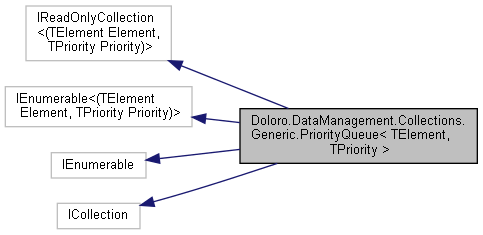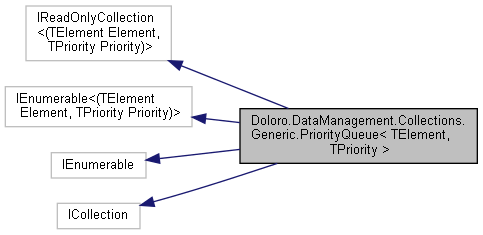Detailed Description
An abstract data-type in which each element additionally has a "priority" associated with it. An element with high priority is served before an element with low priority.
- Template Parameters
-
TElement Specifies the type of elements in the queue. TPriority Specifies the type of priority measure in the queue.


Public Member Functions | |
| PriorityQueue () | |
| Initializes a new instance of the PriorityQueue<TElement, TPriority> class that uses a default comparer. | |
| PriorityQueue (int initialCapacity) | |
| Initializes a new instance of the PriorityQueue<TElement, TPriority> class that has the specified initial capacity. More... | |
| PriorityQueue (IComparer< TPriority > comparer) | |
| Initializes a new instance of the PriorityQueue<TElement, TPriority> class that uses a specified comparer. More... | |
| PriorityQueue (int initialCapacity, IComparer< TPriority > comparer) | |
| Initializes a new instance of the PriorityQueue<TElement, TPriority> class that is empty, has the specified initial capacity, and uses a specified comparer. More... | |
| PriorityQueue (IEnumerable<(TElement Element, TPriority Priority)> values) | |
| Initializes a new instance of the PriorityQueue<TElement, TPriority> class that contains elements copied from the specified collection and uses a default comparer. More... | |
| PriorityQueue (IEnumerable<(TElement Element, TPriority Priority)> values, IComparer< TPriority > comparer) | |
| Initializes a new instance of the PriorityQueue<TElement, TPriority> class that contains elements copied from the specified collection and uses a specified comparer. More... | |
| void | Enqueue (TElement element, TPriority priority) |
| Adds an object to the into the PriorityQueue<TElement, TPriority> by its priority. More... | |
| TElement | Peek () |
| Returns the object with the lowest priority in the PriorityQueue<TElement, TPriority>. More... | |
| bool | TryPeek (out TElement element, out TPriority priority) |
| Attempts to Peek the element with the lowest priority from the PriorityQueue<TElement, TPriority>. More... | |
| TElement | Dequeue () |
| Removes and returns the object with the lowest priority in the PriorityQueue<TElement, TPriority>. More... | |
| bool | TryDequeue (out TElement element, out TPriority priority) |
| Attempts to Dequeue the object with the lowest priority from the PriorityQueue<TElement, TPriority>. More... | |
| void | Clear () |
| Removes all elements from the PriorityQueue<TElement, TPriority>. | |
| void | CopyTo (Array array, int index) |
| Copies the elements of the PriorityQueue<TElement, TPriority> to an Array, starting at a particular Array index. More... | |
| TElement TPriority Priority[] | ToArray () |
Public Attributes | |
| TElement | Element |
| Copies the elements stored in the PriorityQueue<TElement, TPriority> to a new array. More... | |
Properties | |
| int | Count [get] |
| Gets the number of elements contained in the PriorityQueue<TElement, TPriority>. More... | |
| IComparer< TPriority > | Comparer [get] |
| Gets the IComparer<T> for the PriorityQueue<TElement, TPriority>. More... | |
| bool | IsSynchronized [get] |
| Gets a value that indicates whether access to the ICollection is synchronized with the SyncRoot. More... | |
| object | SyncRoot [get] |
| Gets an object that can be used to synchronize access to the ICollection. More... | |
Constructor & Destructor Documentation
◆ PriorityQueue() [1/5]
| Doloro.DataManagement.Collections.Generic.PriorityQueue< TElement, TPriority >.PriorityQueue | ( | int | initialCapacity | ) |
Initializes a new instance of the PriorityQueue<TElement, TPriority> class that has the specified initial capacity.
- Parameters
-
initialCapacity The initial number of elements that the PriorityQueue<TElement, TPriority> can contain.
- Exceptions
-
ArgumentOutOfRangeException initialCapacity is less than zero.
◆ PriorityQueue() [2/5]
| Doloro.DataManagement.Collections.Generic.PriorityQueue< TElement, TPriority >.PriorityQueue | ( | IComparer< TPriority > | comparer | ) |
Initializes a new instance of the PriorityQueue<TElement, TPriority> class that uses a specified comparer.
- Parameters
-
comparer The IComparer<T> to use when comparing elements.
◆ PriorityQueue() [3/5]
| Doloro.DataManagement.Collections.Generic.PriorityQueue< TElement, TPriority >.PriorityQueue | ( | int | initialCapacity, |
| IComparer< TPriority > | comparer | ||
| ) |
Initializes a new instance of the PriorityQueue<TElement, TPriority> class that is empty, has the specified initial capacity, and uses a specified comparer.
- Parameters
-
initialCapacity The initial number of elements that the PriorityQueue<TElement, TPriority> can contain. comparer The IComparer<T> to use when comparing elements.
- Exceptions
-
ArgumentOutOfRangeException initialCapacity is less than zero.
◆ PriorityQueue() [4/5]
| Doloro.DataManagement.Collections.Generic.PriorityQueue< TElement, TPriority >.PriorityQueue | ( | IEnumerable<(TElement Element, TPriority Priority)> | values | ) |
Initializes a new instance of the PriorityQueue<TElement, TPriority> class that contains elements copied from the specified collection and uses a default comparer.
- Parameters
-
values The collection whose elements are copied to the new PriorityQueue<TElement, TPriority>.
◆ PriorityQueue() [5/5]
| Doloro.DataManagement.Collections.Generic.PriorityQueue< TElement, TPriority >.PriorityQueue | ( | IEnumerable<(TElement Element, TPriority Priority)> | values, |
| IComparer< TPriority > | comparer | ||
| ) |
Initializes a new instance of the PriorityQueue<TElement, TPriority> class that contains elements copied from the specified collection and uses a specified comparer.
- Parameters
-
values The collection whose elements are copied to the new PriorityQueue<TElement, TPriority>. comparer The IComparer<T> to use when comparing elements.
Member Function Documentation
◆ CopyTo()
| void Doloro.DataManagement.Collections.Generic.PriorityQueue< TElement, TPriority >.CopyTo | ( | Array | array, |
| int | index | ||
| ) |
Copies the elements of the PriorityQueue<TElement, TPriority> to an Array, starting at a particular Array index.
- Parameters
-
array The one-dimensional Array that is the destination of the elements copied from the PriorityQueue<TElement, TPriority>. The Array must have zero-based indexing. index The zero-based index in array at which copying begins.
- Exceptions
-
ArgumentNullException array is null. ArgumentOutOfRangeException index is less than zero. -or- index is equal to or greater than the length of the array ArgumentNullException arrayis null.ArgumentException The number of elements in the source ICollection is greater than the available space from index to the end of the destination array .
◆ Dequeue()
| TElement Doloro.DataManagement.Collections.Generic.PriorityQueue< TElement, TPriority >.Dequeue | ( | ) |
Removes and returns the object with the lowest priority in the PriorityQueue<TElement, TPriority>.
- Returns
- The object with the lowest priority that is removed from the PriorityQueue<TElement, TPriority>.
- Exceptions
-
InvalidOperationException The PriorityQueue<TElement, TPriority> is empty.
◆ Enqueue()
| void Doloro.DataManagement.Collections.Generic.PriorityQueue< TElement, TPriority >.Enqueue | ( | TElement | element, |
| TPriority | priority | ||
| ) |
Adds an object to the into the PriorityQueue<TElement, TPriority> by its priority.
- Parameters
-
element The object to add to the PriorityQueue<TElement, TPriority>. The value can be null for reference types. priority The priority of the object at the queue.
◆ Peek()
| TElement Doloro.DataManagement.Collections.Generic.PriorityQueue< TElement, TPriority >.Peek | ( | ) |
Returns the object with the lowest priority in the PriorityQueue<TElement, TPriority>.
- Exceptions
-
InvalidOperationException The PriorityQueue<TElement, TPriority> is empty.
◆ TryDequeue()
| bool Doloro.DataManagement.Collections.Generic.PriorityQueue< TElement, TPriority >.TryDequeue | ( | out TElement | element, |
| out TPriority | priority | ||
| ) |
Attempts to Dequeue the object with the lowest priority from the PriorityQueue<TElement, TPriority>.
- Parameters
-
element Dequeued element. priority Dequeued element's priority.
- Returns
- Operation result.
◆ TryPeek()
| bool Doloro.DataManagement.Collections.Generic.PriorityQueue< TElement, TPriority >.TryPeek | ( | out TElement | element, |
| out TPriority | priority | ||
| ) |
Attempts to Peek the element with the lowest priority from the PriorityQueue<TElement, TPriority>.
- Parameters
-
element Dequeued element. priority Dequeued element's priority.
- Returns
- Operation result.
Member Data Documentation
◆ Element
| TElement Doloro.DataManagement.Collections.Generic.PriorityQueue< TElement, TPriority >.Element |
Copies the elements stored in the PriorityQueue<TElement, TPriority> to a new array.
- Returns
- A new array containing a snapshot of elements copied from the PriorityQueue<TElement, TPriority>.
Property Documentation
◆ Comparer
|
get |
Gets the IComparer<T> for the PriorityQueue<TElement, TPriority>.
The IComparer<T> that is used when comparing elements in the PriorityQueue<TElement, TPriority>.
◆ Count
|
get |
Gets the number of elements contained in the PriorityQueue<TElement, TPriority>.
The number of elements contained in the PriorityQueue<TElement, TPriority>.
◆ IsSynchronized
|
get |
Gets a value that indicates whether access to the ICollection is synchronized with the SyncRoot.
true if access to the ICollection is synchronized with the SyncRoot; otherwise, false. For PriorityQueue<TElement, TPriority>, this property always returns false.
◆ SyncRoot
|
get |
Gets an object that can be used to synchronize access to the ICollection.
An object that can be used to synchronize access to the ICollection.
The documentation for this class was generated from the following file:
- D:/Work/GitHub/DGDK22/Assets/Tauri Interactive/Doloro-GDK/Doloro-Data-Management/Runtime/Collections/Generic/PriorityQueue.cs